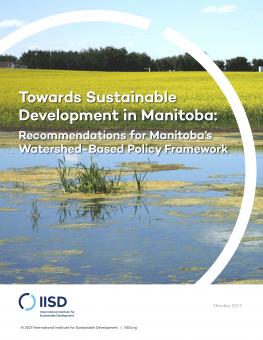
Towards Sustainable Development in Manitoba: Recommendations for Manitoba's Watershed-Based Policy Framework
IISD's recommendations to strengthen proposed programs under Manitoba's Watershed-Based Policy Framework aim for net gains through geographic targeting, an evaluation framework to assess cumulative impacts and value for money, as well as coordination of local level-actions through aligned metrics with other programs related to land and water management.
The Province of Manitoba recently proposed a series of initiatives as part of a new watershed-based policy framework to streamline and coordinate provincial programs and initiatives in the geographic context of watersheds.
These include a proposed "GRowing Outcomes in Watersheds (GROW)" program focussed on obtaining ecological goods and services from the agricultural landscape; "Watershed-Based Drainage and Water Resource Management" for creating a streamlined approach for addressing drainage and water retention projects; and the "Modernization of Manitoba's Conservation Districts Program" to strengthen collaboration and delivery measurable outcomes.
IISD has been active in Manitoba-based research for close to three decades, providing technical and policy insight on provincial issues including climate change mitigation and adaptation, sustainable agriculture, watershed management, and water resources management in the context of Lake Winnipeg. IISD works to balance social, economic and environmental outcomes in policy design and implementation. In addition, IISD-Experimental Lakes Area provides world-class research on aquatic ecosystems and has provided evidence for global decisions around air and water pollution.
IISD is pleased to see the structure and content of the three consultation documents under the proposed watershed-based policy framework. We have long promoted a watershed approach to integrated land and water management as a means to greater impact, more measurable outcomes and stronger local-level engagement.
Watersheds provide us with a range of important benefits, and good management can mean better environmental, economic and social systems for Manitobans long into the future. The proposed programs are an opportunity to demonstrate strong, made-in-Manitoba solutions for coordinated, evidence-based watershed management resulting in multiple benefits for all Manitobans. In order for the proposed watershed-based programming to be impactful, achievable and sustainable, they must:
- Aim for restoration or a net gain of identified, priority ecological goods and services (EGS) and water-retention capacity;
- Target regions and ensure that the most effective actions are matched with them for the most impact and the least cost;
- Include a robust, evidence-based evaluation framework focused on cumulative improvements and a value-for-money analysis;
- Adopt effective measurement that takes into account conventional environmental monitoring, cost–benefit analyses, community-based monitoring, traditional and local knowledge, remote sensing and other analytical means available.
- Strengthen coordination in the context of watershed management, particularly between geographies, impacts, agencies and processes.
Participating experts
You might also be interested in
Powering the Clean Energy Transition: Net-Zero electricity in Canada
This brief explains how a shift to clean power generation can offer affordable, reliable electricity, benefiting households and businesses alike.
Why Liquefied Natural Gas Expansion in Canada Is Not Worth the Risk
An analysis of the economic and environmental risks of liquified natural gas expansion in Canada.
New Report Highlights Economic and Environmental Costs of Canada’s LNG Expansion
New report explains how LNG expansion will not only hamper Canada’s progress toward its climate goals but also create challenges for the economy in the long term.
INC-4 Is an Opportunity to Address Fresh Water Pollution – This is how
INC-4 is the fourth meeting in a series of international negotiations that aims to develop a global treaty on plastic pollution that could and should have big implications for freshwater quality both in Canada and beyond.